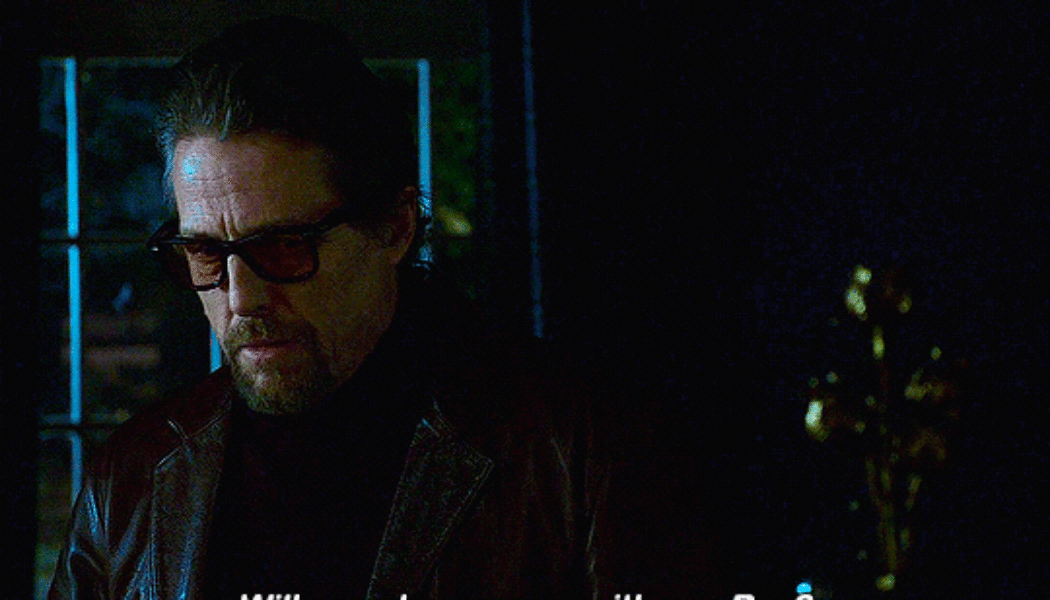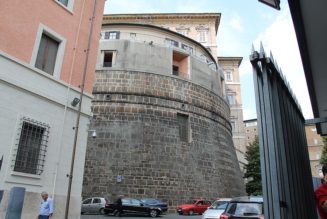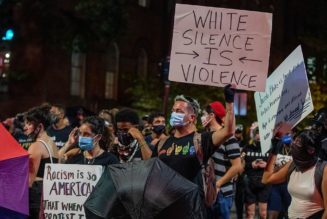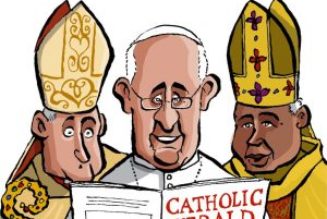Happy Friday friends,
And a belated happy feast of St. Apollonia to you all.
As a few of you noted in emails to us, Apollonia’s feast was properly marked yesterday, not Tuesday — despite what JD told you in his last newsletter.
As others of you noticed, it was not the first time m’colleague has gotten his dates rather obviously wrong when it comes to saints’ days. It’s the second time.
JD is a treasured friend, an excellent journalist, a peerless interviewer, a noted balloon enthusiast, and I’d even go so far as to say a reasonably competent canonist. Though he cannot, it seems, read a liturgical calendar with any accuracy.
I confess I find this difficult to believe, given his exacting, some might say irritating, obsession with detail when editing me.
Today, if you would like to know, is the feast of St. Scholastica, and the anniversary of the shipwreck of St. Paul on the island of Malta.
I had intended to write something about a Roman-era legend which held that Malta was populated by cannibals, and so St. Paul had every reason to be shocked by the warm welcome he received on the island. But it turns out that there was no such legend, and the Italian priest who told me that was yanking my chain.
I will deal with him later.
Though I’m afraid the result is I don’t have any particularly interesting bits of trivia about today, but I can at least assure you that today is, in fact, Friday, Feb. 10, 2023. So, there’s that.
The News
Several priests, seminarians, and Church employees were among 222 political prisoners forcibly deported from Nicaragua this week.
As our correspondent Edgar Beltrán reported, among the deportees is Fr. Óscar Benavidez, who was sentenced to 10 years in jail and “civil death” for his opposition to the brutal Ortega dictatorship.
Civil death, officially known as “perpetual loss of citizen rights,” means the condemned loses their right to Nicaraguan nationality, to have an ID card, a passport, a work permit, a driver’s license, and even civil rights such as free speech and association. That’s the kind of treatment Catholics are receiving in Nicaragua.
This is a very important story, read the whole thing.
—
This Lent, you’re going to notice some changes in the confessional. At least I hope you will.
The formula for the words of absolution is changing. And there’s a new act of contrition — actually it’s kind of an old one that’s now newly approved, which is a little tricky to explain… so we did an explainer.
—
Fr. Sean Gough is a priest of the Archdiocese of Birmingham, in the U.K.. Last year, he was charged by police for the crime of standing on a local city sidewalk holding a sign that said “Praying for freedom of speech.”
Those protection orders have become a lightning rod for criticism, and a flashpoint for debate about the nature of free speech in a free society in the U.K. — even as the government considers rolling them out on a national basis.
Speaking with Luke Coppen, Gough said that he went to the exclusion zone, where he knew that demonstrating for or against abortion is banned, “in order to pray for freedom of speech, which is a God-given right which I believe is being more and more infringed upon in our society.”
Gough told Luke he’s now in a legal gray area. He’s been told he’s not being prosecuted for the moment, but the cops are holding the charges against him in reserve and he is now in a fight to clarify his situation.
“When [the police] dropped the charges in the letter that they sent to me, they explicitly stated that they reserve the right to pursue them again at a later date. And I really don’t want that hanging over me.”
“I don’t believe I broke any laws or any rules,” Gough said. But the cops seem to think differently. And if holding a sign saying “praying for free speech” is a crime, that’s kind of a big deal.
Read the whole conversation here.
—
A U.S. diocese made the news this week for publishing an updated report on historical cases of clerical abuse of minors, but not publishing a central list of names of accused clerics.
The report did not include the names of accused clerics. And Worcester is one of a handful of U.S. dioceses that don’t keep an updated public list of accused clerics going back through the term of the report.
Bishop McManus has been clear on his reasons:
“There is no other precedent for the publishing of lists of the accused in society – even of those accused in other positions of trust such as medicine, education or law enforcement,” he said. The bishop is not wrong in that fact. And he made the important point that the diocese publishes details of every individual cleric removed from ministry following an accusation, names included, just not on a central “accused list.”
But while public lists naming the names of accused clerics might not be perfect, survivors and victims’ advocates point out that they do serve some important purposes, helping other survivors to come forward and providing some kind of validation and justice for the victims of clerics who have died and are beyond the reach of a legal process.
This isn’t the straightforward “of course they should/shouldn’t” argument you might think. It’s complicated, but it merits puzzling through. And, as the focus shifts from historical cases of child abuse to more contemporary cases involving adults, we need to have the conversation.
So should dioceses publish lists?
You can read my whole analysis of that question, here.
—
A French Catholic diocese known for its abundant vocations, and as a refuge for traditionalist communities, will undergo an apostolic visitation, we learned this week.
But it’s also had some problems. Local Bishop Dominique Rey got a “fraternal visit” from his local metropolitan archbishop in 2020. Then Rey had a meeting with Cardinal Marc Ouellet before the Vatican took the very rare step of suspending all ordinations in the diocese in June last year.
Now, the Vatican has asked Dijon’s Archbishop Antoine Hérouard to formally visit the diocese.
So, what’s going on? And what’s it all about? Read the whole thing here.
—
The Diocese of Pittsburgh looks set to join a growing number of dioceses restricting priests’ freedom to celebrate the ordinary form of the Mass ad orientem.
Zubik, we were told, was clear that he’s not against the practice — and went out of his way to stress the good intentions and pious motivations of the priests who want to celebrate Mass this way.
But the bishop has also run into the same problem seen by bishops in other U.S. dioceses, with priests in some parishes making changes to the way Mass is said, without necessarily giving catechesis to inform and bring parishioners along with the project.
On top of the discussion about catechesis, pastoral needs, and local (often generational) sensitivities, there’s also the interesting issue of what the General Instruction of the Roman Missal actually says and means regarding the celebration of Mass facing East, and, of course, what the Second Vatican Council actually taught.
And then there’s Pope Francis’ motu proprio on the extraordinary form of the Mass, Traditionis custodes. It isn’t about the ad orientem posture, but it looms large in this conversation anyway. And the conversation will continue, especially as liturgical sensibilities shift among the U.S. presbyterate.
It’s important to know how that conversation is happening.
—
Pillar reader Cardinal Angelo Becciu was received in a private audience by Pope Francis on Thursday.
It’s not the first time Francis and Becciu have spoken since the cardinal was sacked by the pope in September 2020, though it is the first time Becciu has been given a formal audience listed in the daily Vatican bulletin.
Becciu released a statement to media after the audience, saying that he and Francis “had a very cordial and serene conversation” and that “the Holy Father renewed his esteem and trust in me, as has been the case for some time now.”
It’s not yet clear if Becciu secretly recorded his conversation with the pope (he’s been known to do that). So, until he releases the tapes, we’ll just have to take his word for it. Meanwhile, he remains on trial in Vatican City for embezzlement, abuse of office, conspiracy, and witness tampering.
Why it matters
This week we continued reporting on misconduct allegations against Frank Pavone, the laicized priest and director of Priests for Life.
Soon after she arrived, “[Pavone] started on the flirty-flirty touching, paying way too much attention to me, touching my hair, or stroking my back. He’d reach around me to type emails, leaning over me, on top of [my arms] — and it was continuous. It was just creepy,” Worthington alleged.
The behavior got worse. Eventually, she said she “became so overwhelmed and so stressed out. My hair turned gray. I dreaded being with him in the office. It was like: ‘How do I make this guy go away?’”
We also spoke to other women who knew Worthington at the time, one of who also worked at Priests for Life, and they told us they remembered how distressed she had been by what was happening.
Pavone, for his part, told us that he is “enormously saddened by recent efforts of some to revisit old accusations that contain numerous inaccuracies, misrepresentations, and mistruths, that have already been addressed.” He did not specify what the “inaccuracies, misrepresentations, and mistruths” actually were.
National pro-life leader Eric Scheidler called that out, telling us that: “I have been trying without success to get straight answers from Frank. He really needs to make a public statement about this and come clean about what did or did not happen, and what steps have been taken to truly resolve this scandal.”
I mentioned the other week that we got quite a bit of negative feedback, and lost some subscribers, when we first published allegations of sexual misconduct against Pavone by a young woman who worked at his pro-life organization. And we’ve already had more of the same.
We get feedback from a small crowd who seem to think we, The Pillar, are part of some grand liberal conspiracy, hell-bent on taking down someone for their witness against abortion. Unserious things like that don’t especially keep me up at night.
But others are asking why we continue to report these allegations against Pavone as they emerge — he’s no longer a cleric, they say, so why should anyone care?
Here’s why they should care:
First, Frank Pavone ran, as a cleric, and continues to run, as a layman, a prominent organization in the pro-life movement. That movement’s witness is for the dignity and welfare of women and their children, and where the credibility of that witness is undermined it needs to be challenged.
Second, Worthington told us she complained about what she experienced to Pavone’s diocese about his alleged behavior, and here’s what she said happened — she was contacted by the diocese and “asked if [Pavone] ever put his hands under my clothing, and if I was a minor when it happened. And [the diocesan official] just said that I was of age, and that was pretty much it.”
Now, the diocese hasn’t commented on these allegations.
And the Church has a long way to go in learning how to best handle complaints of harassment and even abuse of adults, and it is going to get, at times, complicated.
But I think everyone can agree we need to do better than this.
That’s why we reported this story, and why we will keep reporting stories like this.
And if you think this work matters, well, we really would appreciate you helping us do it.
Customer service
This week I was asked by quite a few people about a story that we have not covered here at The Pillar, and for my “take” on it.
Apparently, these “RTCs” are “typically characterized by the rejection of the Second Vatican Council,” and a preference for the extraordinary form of the Mass, which makes them a likely hotbed of “anti-Semitic, anti-immigrant, anti-LGBTQ and white supremacist ideology,” according to the FBI.
The memo also notes that the rad-trad community is ripe for infiltration and source development, both online and in person at “places of worship” — I guess the Walter Mitty who wrote the memo thought calling them “churches” would break his little Jack Ryan fantasy.
Anyway, we haven’t covered this story simply because we don’t have anything new to add to the coverage. That tends to be how we roll — if we can add value, we will.
As for my “take” on the story, which a lot of people have asked me for, I’ve said here before that my opinion about any given news item doesn’t, or shouldn’t matter particularly, beyond its potential entertainment value; the work that matters for us is the reporting, everything else is just color.
But look, we’re also a subscriber-dependant outfit here and, as it happens, we’re a little behind the curve right now, by about 200-odd subs, and I have a strong incentive to give you people what you want — within the bounds of reason and decency.
So let’s make a deal.

I’ll give you my “take,” if you have a good hard think about hitting this subscribe button and helping us keep on with the reporting. How’s that?
Seriously, this email goes to tens of thousands of free readers every week, if a fraction of you can find the five bucks a month, that would be a big deal for me — I have a cute baby to feed, and she eats like a trucker.
Assuming at least some of you will do the right thing here, I’ll give you a brief summary of my thoughts on the FBI memo:
1. I am fairly skeptical of law enforcement as a baseline. With regard to the Feds, it’s my opinion that, in addition to their being rife with competing and often conflicting political agendas and prejudices from the top down, they have, for decades, treated communities who are too religiously observant as obviously suspicious, probably sinister, and likely dangerous.
It surprises me not one whit that some field office drone who’s read a few Dan Brown novels and a piece in the Atlantic about the link between gun culture and the rosary (that’s a real article, really cited in the memo) would write a feverish memo about the dangers of incense and Latin to our society.
And it’s more than a little perverse that the FBI is worried about the threat of churches instead of to them, given the national spate of vandalism and arson attacks we’ve seen in recent years.
2. I think it’s at least fair to point out that if the FBI memo reads like it was written by a Know-Nothing Freemason, some of the more prominent individuals who associate themselves with traditional Catholic communities – and presume to speak for them – haven’t done anyone any favors here, least of all the ordinary and good people who go to Extraordinary Form Masses.
I can think of one popular YouTuber who had to scrub several episodes of his “show” after Jan. 6 because, with the benefit of hindsight, maybe he went a little too all-in on the Stop the Steal movement and the need to “resist.”
And there was another very online lady who trades on her “real” Catholic bona fides who was posting selfies from the Capitol on the day of the riots, as I recall.
And then there’s Archbishop Viganò, who issued a missive recently backing Vladimir Putin as the last great hope of Christian civilization.
So, you know, there’s that.
3. While the traditional Latin Mass isn’t my liturgical preference, I do know quite a few families for whom it is the anchor of their faith and the locus of their community. And they are, without exception, some of the most loving, generous, faithful, welcoming people I have ever met. They’re not well-represented by the folks I reference above.
The idea of some cack-handed G-man trying to go undercover in their parish, desperately sniffing around for domestic terrorism, is perhaps the funniest thing I have heard in some time.
“Pax vobiscum, fellow God worshipers, has anyone committed any good hate crimes lately?”
In fact, a delusional Fed trying to infiltrate a suburban TLM parish, sniffing around for the conspiracy at the heart of a moms’ rosary group or the sinister goings on at a Knights of Columbus bar, is one of the best pitches for a comedy I can think of.

Someone should write that.
The places we go to sit down
I’ve mentioned before that my family is currently on an extended stay in London, visiting family and friends after too long of an absence.
We were kept away for a long time; first by Covid and then by the ineptitude of the District of Columbia vital records department, which made a typo on my daughter’s birth certificate and then took nine months to correct it, meaning we couldn’t get her a passport.
One of the things I looked forward to most in coming back was taking our daughter to our old parish, to the church in which we were married. It is in that parish community that the roots of our family’s faith are planted. And, in a real way, our daughter is a fruit of that faith, a faith in God’s faithfulness. I’m glad we made it back.
I’m also grateful to have made it back to my formerly regular pub, which is just behind the parish church. Sacramental piety to one side, I confess there’s no bright line in my mind (or my affections) between the church and the pub; I’ve probably spent nearly equivalent hours in both and with the same people. We are, Lumen gentium reminds us, saved by God not as individuals but as a people, an elect, an ecclesia. A community.

The highlight of my trip so far may actually be walking in after three years away to have the bartender, CJ, look up and without missing a beat ask if I wanted my usual, and how was America, anyway? And as the bar filled up with the post-Saturday evening Mass crowd, I was glad to see the people, and grateful to be there.
We need places to sit down together, to drink beer, to talk, to not be hurried, and to be known. And we are losing those places at a rate of knots.
I’m told pubs are closing in the U.K. at a rate of some 400 a week, which I find slightly terrifying to contemplate, crushed under the weight of ever heavier operating costs.
Many of those left, if they have the floor space, are being converted into the kind of meals-forward, pub-themed restaurants I abhor and avoid in America. Apparently, the tax on beer sold over the bar is now so high that, in a weird inversion of the restaurant trade, pubs can’t scrape a profit off of pints, and the real mark-up is on food.
Mercifully, the King and Queen is still open, and too small to get the gastro-pub treatment. Sharing a meal is good, don’t get me wrong, but a meal has a purpose, a start time, a set number of courses to run, and a definite end.
A session with friends in a proper pub begins when it happens, and goes on as long as it does. There is no point, no center to the event, no thing you can claim to have accomplished at the end.
A good pub is, to my mind, a place to waste time — in the best sense. And if the time you are willing to waste with someone is often the best mark of how much they mean to you, the place where you waste it with them becomes its own kind of living memory.
And sometimes you just need a place to sit quietly.
See you next week,
Ed. Condon
Editor
The Pillar









